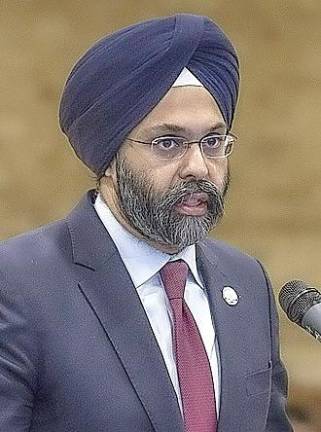NJ recovers $15 million from pharmaceutical company
Law & Order. NJ has settled a case with a pharmaceutical company, recovering more than $15 million for NJ's Medicaid Program, after allegations the pharmaceutical company improperly marketed treatment for Opioid addiction.

NJ Attorney General Gurbir S. Grewal and the Office of the Insurance Fraud Prosecutor today announced that New Jersey and other states have reached an agreement with the pharmaceutical company Reckitt Benckiser Group (“Reckitt”) to settle allegations that the company improperly marketed and promoted Suboxone, a drug for treating opioid addiction, resulting in improper costs for state Medicaid programs.
Reckitt will pay a total of $700 million to resolve various civil fraud allegations impacting Medicaid and other government healthcare programs, of which more than $400 million will go to the Medicaid program. New Jersey’s Medicaid program will receive more than $15 million, with more than $5.7 million being returned to the State itself.
“Reckitt Benckiser took advantage of individuals already suffering from opioid addiction to increase its own profits at the taxpayer’s expense,” said Attorney General Grewal. “This settlement holds one company accountable, and we will continue to work to hold accountable others who have contributed to the opioid epidemic through their conduct in the board room or anywhere else.”
Suboxone is a drug product approved for use to treat opioid addiction to avoid or reduce withdrawal symptoms while undergoing treatment. Although it is used to treat opioid addiction, Suboxone and its active ingredient, buprenorphine, are themselves powerful and addictive opioids.
Reckitt is an English public limited company headquartered in Slough, England. Until December 2014, Reckitt’s wholly owned subsidiary Indivior Inc. (then known as Reckitt Benckiser Pharmaceuticals, Inc.) distributed, marketed, and sold Suboxone Sublingual Tablets and Suboxone Sublingual Film in the United States.
In December 2014, Reckitt spun off Indivior Inc. The settlement described in this statement is with Reckitt alone. To resolve its potential criminal liability stemming from conduct alleged in the indictment of Indivior, Inc., Reckitt has entered into a separate non-prosecution agreement.
The civil settlement resolves allegations that, from 2010 through 2014, Reckitt, directly or through its subsidiaries, knowingly:
· promoted the sale and use of Suboxone to physicians who were writing prescriptions to patients without any counseling or psychosocial support, such that the prescriptions were not for a medically accepted indication and were for uses that were unsafe, ineffective, and medically unnecessary and that were often diverted for uses that lacked a legitimate medical purpose;
· promoted the sale or use of Suboxone Sublingual Film based on false and misleading claims that Suboxone Sublingual Film was less subject to diversion and abuse than other buprenorphine products and that Suboxone Sublingual Film was less susceptible to accidental pediatric exposure than Suboxone Sublingual Tablets;
· submitted a petition to the Food and Drug Administration on September 25, 2012, fraudulently claiming that it had discontinued manufacturing and selling Suboxone Sublingual Tablet “due to safety concerns” about the tablet formulation of the drug; and
· took other steps to fraudulently delay the entry of generic competition for various forms of Suboxone in order to improperly control pricing of Suboxone, including pricing to federal healthcare programs.
The civil settlement resolves the claims against Reckitt brought in six qui tam lawsuits pending in federal courts in the Western District of Virginia and the District of New Jersey.
A National Association of Medicaid Fraud Control Units (“NAMFCU”) Team participated in the investigation and in settlement negotiations. The Team included representatives from the Offices of the Attorneys General for the states of California, Indiana, New York, Ohio, Virginia, and Washington.
“This settlement holds one company accountable, and we will continue to work to hold accountable others who have contributed to the opioid epidemic through their conduct in the board room or anywhere else.” NJ Attorney General Grewal